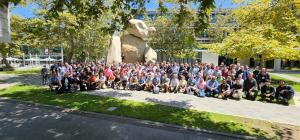On operation scenarios and control
The 11th ITER International School concluded successfully in San Diego, USA, on 29 July after five days of lectures and discussions on the development of tokamak operation scenarios and how to control them.
After a hiatus of two years due to COVID pandemic, it was finally possible to organize the traditional ITER International School again. A total of 175 Master's, graduate or postdoctoral students gathered at the end of July in San Diego, California, for the 2022 ITER International School, this time focusing on ITER operation scenarios and control.
The ITER International School was the 11th in the series, which alternates between sites in Aix-en-Provence, in the south of France, close to where ITER is being constructed, and external hosts within the ITER Member countries. This time it took place at the sunny campus of the superbly located University of California San Diego (UCSD), organized by the US Burning Plasma Organization (USBPO), UCSD, General Atomics, and the ITER Organization. Well known for its own contributions to fusion research, UCSD is the next-door neighbor of the US National Facility DIII-D, a tokamak hosted by General Atomics. General Atomics is also responsible for the manufacturing of the ITER central solenoid coils.
The focus of this year's school lay on the development of operation scenarios for tokamaks and how to control them—both key issues for the design and deployment of any tokamak. Common operation scenarios were discussed, but also alternatives. The non-linear nature of tokamak plasmas makes various operating points possible, but the study of these scenarios—not only empirically but also their simulation—is not a straightforward affair. Developing the operation scenario of any tokamak requires the detailed understanding of the device's technical capabilities, such as the characteristics of its magnets that confine the plasma, and other actuators such as plasma heating and fuelling.
To prepare optimally for ITER operation, accurate operation scenario simulation capabilities need to be developed, often in conjunction with experimental research that identifies and/or validates the necessary simulation models. This requires knowledge of complex operation limits, often determined by the onset of instabilities that may lead to a disruption of the tokamak discharge and termination of fusion power production in ITER. Robust control may prevent operation scenarios from approaching such limits, or avoid the further destabilization of the plasma. Thus, operation limits, control capability and the disruptivity of a tokamak operation scenario are integrally linked. This is especially true for ITER, which needs to share its set of actuators to perform multiple control tasks (with some actuators involved in multiple control tasks) and for which control performance requirements are very stringent given the large plasma magnetic and thermal energies required for fusion power production.
At the school, leading specialists in the field of tokamak control and scenario development and simulations provided many hours of lectures on the strongly interlinked points highlighted above. This was interspersed with long and often intense discussions between lecturers and students. The students also had the opportunity to visit the DIII-D National Fusion Facility and appreciate with their own eyes the complexity of a leading research tokamak device.
Besides lectures and discussions, the students also had the opportunity to present their own research on a wide range of topics during two poster sessions at the School. For each of the two sessions, three high-quality posters were rewarded with a prize consisting of an engraved sample of ITER central solenoid niobium-tin superconducting cable and a photobook of ITER construction. The six students whose worked was recognized by these prizes were: Laura Dittrich (KTH Royal Institute of Technology, Sweden), Giacomo Dose (University of Rome, Italy), Alvin Garcia (University of California Irvine, USA), Brian Leard (Lehigh University, USA), Rebecca Masline (University of California San Diego, USA) and Simon Van Mulders (École Polytechnique Fédérale de Lausanne, Switzerland).
Excellently hosted by Charles Greenfield (General Atomics and USBPO) and Dmitriy Orlov (UCSD), the 2022 ITER International School provided young scientists and engineers with a taste of the stimulating, multi-disciplinary and challenging field that is magnetic confinement fusion.
The slides of the 2022 lectures are available on this ITER webpage together with the information on past ITER International Schools.



